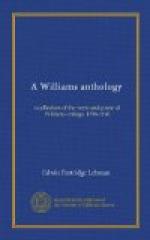“Why,” he wondered, “doth not Preferment live with me? Am I not as fit a man as the King’s Favorite?” And he stretched out his long legs and looked at them.
As long as the Fool was occupied with dreaming and laying the sods on his house, or hunting for the dun deer of a moonlit night, he was company enough for himself, turning his fancies over and over in his mind, as the wind bundles the clouds about the sky; then when he had arranged his conceptions to his taste, he was free to admire them undisturbed, until a new fancy happened along to displace them; just as the wind leaves off driving the clouds at sunset, and in the west there is a sweet tableau for men to look at, till night blots out the scene. So the Fool was usually well content to be alone. But when, as now, he was perplexed by any problem that disturbed his simple cheerfulness, he had to seek some other and wiser man for counsel, not being one of those men, more mind than heart, who unravel problems with as much accuracy and equanimity as a skilful weaver plies his loom.
So that evening, with the moon sending his shadow out ahead of him, the Fool walked overfield to the cave of the Wise Man. Timidly approaching, he peered through the entrance and found the Wise Man sitting still and alone, gazing into the ashes of a flickering fire.
“Please,” said the Fool anxiously, “why does Preferment ride with the King’s Favorite and never with me?”
The other did not stir for a long while, but after the Fool had shifted several times from one foot to the other, beginning to despair of an answer, the Wise Man spoke.
“Because,” he said slowly, still looking into the fire, “thou hast never desired him to.” And, having spoken, he kept silent, and after a little the Fool turned away.
“I never desired him to?” he muttered over and over to himself. “What does that mean?” And he stood stock still and looked about for explanation; but none was vouchsafed by the moon, or the bushes, or night itself, the customary adviser of the Fool’s doubts and queries.
“How is this?” he said again. “Did the King’s Favorite, then, desire him? And will Preferment come if he be wanted? And how does one ask him?”
All this was inexplicable to the Fool and he took courage to return to the cave.
“Tell me,” he asked of the Wise Man, “did the King’s Favorite want Preferment more than I? And how does Preferment come if he is wanted?”
The Wise Man nodded gently to himself. “Aye,” he muttered, “so it is, so it is.” The Fool gazed in amazement at this, but because he thought all Wise Men are somewhat mad, he waited and did not run away, as his heels advised.
“Listen,” the Wise Man began again, “this man has so wanted Preferment all his life that he has given up everything that is dear to him. He has crushed underfoot every dream and vision save this alone, to be seen in the company of Preferment.” The Wise Man turned and looked about at the Fool. “He has no sod house,—no days afield and by the brook. He never heard the night-song of the wind or the winter-rune of the pine. Nothing of all these things that you love has he had.”




